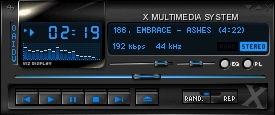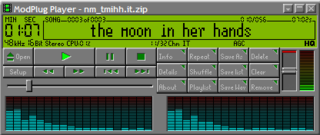Related Research Articles

X Multimedia System (XMMS) is an audio player for Unix-like systems released under a free software license.

Winamp is a media player for Microsoft Windows originally developed by Justin Frankel and Dmitry Boldyrev by their company Nullsoft, which they later sold to AOL in 1999 for $80 million. It was then acquired by Radionomy in 2014, now known as the Llama Group. Since version 2 it has been sold as freemium and supports extensibility with plug-ins and skins, and features music visualization, playlist and a media library, supported by a large online community.
A music tracker is a type of music sequencer software for creating music. The music is represented as discrete musical notes positioned in several channels at chronological positions on a vertical timeline. A music tracker's user interface is traditionally number based. Notes, parameter changes, effects and other commands are entered with the keyboard into a grid of fixed time slots as codes consisting of letters, numbers and hexadecimal digits. Separate patterns have independent timelines; a complete song consists of a master list of repeated patterns.
Scream Tracker is a tracker. It was created by Psi, one of the founders of the Finnish demogroup Future Crew. It was written in C and assembly language.
XM, standing for "extended module", is an audio file type introduced by Triton's FastTracker 2. XM introduced multisampling-capable instruments with volume and panning envelopes, sample looping and basic pattern compression. It also expanded the available effect commands and channels, added 16-bit sample support, and offered an alternative frequency table for portamentos.
Info-ZIP is a set of open-source software to handle ZIP archives. It has been in circulation since 1989. It consists of 4 separately-installable packages: the Zip and UnZip command-line utilities; and WiZ and MacZip, which are graphical user interfaces for archiving programs in Microsoft Windows and classic Mac OS, respectively.

7-Zip is a free and open-source file archiver, a utility used to place groups of files within compressed containers known as "archives". It is developed by Igor Pavlov and was first released in 1999. 7-Zip has its own archive format called 7z, but can read and write several others.

OpenMPT is an open-source audio module tracker for Windows. It was previously called ModPlug Tracker, and was first released by Olivier Lapicque in September 1997.
FastTracker 2 is a music tracker created by Fredrik "Mr. H" Huss and Magnus "Vogue" Högdahl, two members of the demogroup Triton which set about releasing their own tracker after breaking into the scene in 1992 and winning several demo competitions. The source code of FastTracker 2 is written in Pascal using Borland Pascal 7 and TASM. The program works natively under MS-DOS.
MOD is a computer file format used primarily to represent music, and was the first module file format. MOD files use the “.MOD” file extension, except on the Amiga which doesn't rely on filename extensions; instead, it reads a file's header to determine filetype. A MOD file contains a set of instruments in the form of samples, a number of patterns indicating how and when the samples are to be played, and a list of what patterns to play in what order.

WinRAR is a trialware file archiver utility for Windows, developed by Eugene Roshal of win.rar GmbH. It can create and view archives in RAR or ZIP file formats, and unpack numerous archive file formats. To enable the user to test the integrity of archives, WinRAR embeds CRC32 or BLAKE2 checksums for each file in each archive. WinRAR supports creating encrypted, multi-part and self-extracting archives.

Module file is a family of music file formats originating from the MOD file format on Amiga systems used in the late 1980s. Those who produce these files and listen to them form the worldwide MOD scene, a part of the demoscene subculture.
WavPack is a free and open-source lossless audio compression format and application implementing the format. It is unique in the way that it supports hybrid audio compression alongside normal compression which is similar to how FLAC works. It also supports compressing a wide variety of lossless formats, including various variants of PCM and also DSD as used in SACDs, together with its support for surround audio.
MO3 is a tracker module file format developed by Ian Luck for the BASSMOD engine. MO3 files contain samples encoded in the MP3 or Ogg Vorbis formats, rather than straight PCM samples. This results in reduced file size for the module, while maintaining almost identical audio quality. Lossless audio encoding is also supported, for samples that do not compress well with lossy encoding.
S3M is a module file format, the successor to the STM format used by the original Scream Tracker. Both formats are based on the original MOD format used on the Amiga computer.
Impulse Tracker is a multi-track music tracker. Originally released in 1995 by Jeffrey Lim as freeware with commercial extensions, it was one of the last tracker programs for the DOS platform.

ModPlug Player is a module file player developed by Olivier Lapicque in conjunction with the original ModPlug Tracker project and the ModPlug Browser plugin. Features include a playlist editor, graphical equalizer, automatic gain control, bass expansion, reverb, Dolby Surround Sound support and the ability to mix two modules simultaneously and to change their pitch and tempo. The player supports a variety of module music files in both native and compressed formats.

AIMP is a freeware audio player for Windows and Android, originally developed by Russian developer Artem Izmaylov. It supports a variety of audio codecs, and includes tools to convert audio files and edit their metadata. It also has the capability of installing user-made skins and plugins.
MilkyTracker is a free software multi-platform music tracker for composing music in the MOD and XM module file formats.
References
- ↑ mod4win_v240.zip>WHATSNEW.TXT, MOD4WIN 2.40 last Beta, What's New in the Beta?:, ------------------------, 1999/5/3, ----------,* Made full version free available
- ↑ Schmid, Dave (2007-08-31). "Old Skool – MOD4WIN". pulpfree.com. Retrieved 2011-05-28.